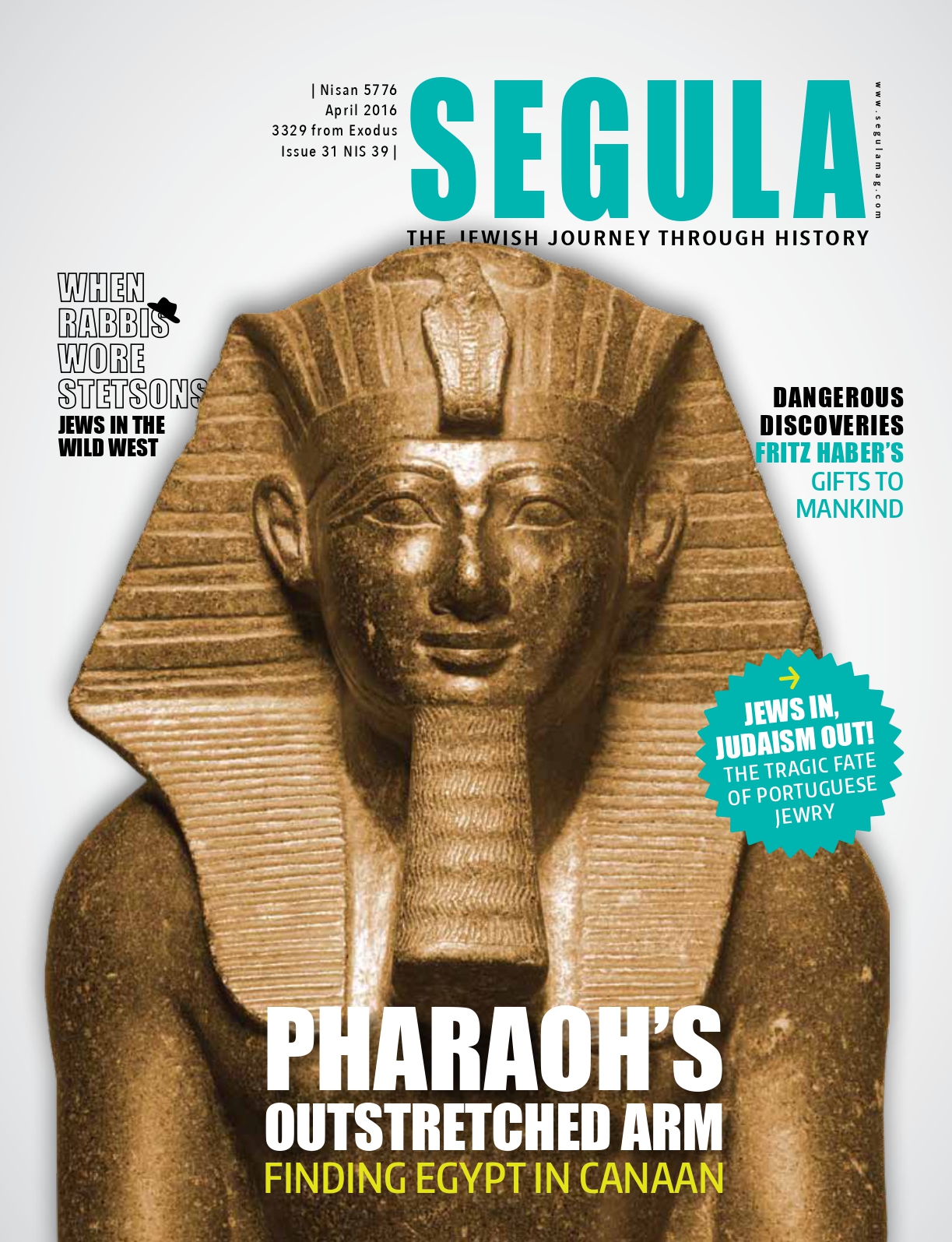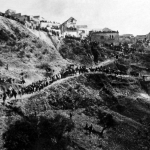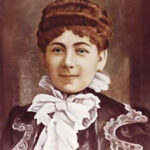Manuel of Portugal had to choose between his Spanish bride – and her powerful parents – and his faithful Jewish subjects. The Portuguese monarch preferred to have his cake and eat it too, and as usual the Jews, who’d already endured one expulsion, paid the price
The golden age of Spain – how golden it was or wasn’t, its cataclysmic end, and its ongoing effects on Jewish and world history – has fascinated scholars of Judaic studies since the field’s inception. Strange as it may seem, when it comes to Spanish Jewry’s contemporaries across the border in Portugal, we know far less.
The interlocking dramas of the Jews of Portugal and Spain reached an unexpected and decisive climax in the last years of the 15th century, when both communities suddenly disappeared. Their fate highlights Diaspora Jewry’s hopeless dependence on the politics and economics of its host countries.
A Royal Opportunist
Three powerful forces governed late medieval Portugal: the king, the nobility, and the Cortes, a kind of parliament including representatives of both the burghers and the Church. The Cortes was the most anti-Semitic of the three. The burghers saw Jewish tradesmen as competition in Portugal’s urban centers, while the Church reviled the Jews for religious reasons. The king’s attitude toward the Jews was therefore very much a product of how dependent he was on the Cortes. Kings like Edward I (1433–38) and Afonso V early in his reign were eager to weaken the nobility’s grip, so they joined forces with the Cortes and passed anti-Jewish laws and regulations. Kings such as John I (1385–1433) and Afonso V later in his reign valued the Jews for stimulating the economy without threatening the monarchy. Supporting the Jewish community was a perfect way for a king to lessen parliamentary influence while shoring up his own.
The turning point for the Jews of Portugal was the expulsion of Spanish Jewry in 1492. Roughly 120,000 Jewish refugees, mostly from Castile (on the Portuguese border), crossed over into Portugal, attracted by the community’s relative well-being, proximity, and familiar language and culture. Some of these exiles planned to stay; others were headed for Islamic North Africa. Regardless, their path was thorny.
The strongest resistance came from the Cortes, with surprising support from local Jewry, which feared its institutions and hierarchy would be overwhelmed by the newcomers. John II and his advisers fiercely debated his subjects’ objections to the refugees.
John’s two great endeavors were Portuguese expansion – overland and by sea along the coast of Africa – and reducing the nobles’ authority. He took away their judiciary powers, limited their economic privileges, and demanded written proof of their rights to cultivate any estates previously belonging to the crown. He forced these aristocrats, as well as the rulers of towns and cities, to pledge allegiance to him. Aided and abetted by the Cortes, he portrayed himself as the people’s champion, protecting them from the nobility’s authoritarian whims.

The House of Braganza, which owned about a third of Portugal (and happened to be the patron of the famous Jewish Abravanel family), was John’s greatest enemy. He imprisoned the duke, exiled his brother, and later had him executed. In 1484 he murdered his brother-in-law and cousin, the duke of Viseu, with his own hands, and had the bishop of Evora poisoned. Many others, real or perceived threats to his throne, died or disappeared. In the Portuguese political triumvirate of clergy, nobility, and burghers, John clearly sided with the Cortes, which viewed the Jews as rivals.
Yet the king was well aware that the Spanish Jewish refugees could make Portugal an economic, scientific, cultural, and technological powerhouse. And by charging each a fee for entering his kingdom, he could finance his wars with Muslim North Africa. So John granted entry to certain categories of Jews. Permanent residential permits went for sixty thousand gold crusados, and six hundred wealthy families paid the price. Temporary permits were available for those en route to North Africa, allowing for an eight-month stay at a bargain rate of eight crusados.
Marooned, Raped, or Murdered
Given the king’s conflicting interests, it’s no surprise that he rapidly changed his mind. Fanned by the influx from Spain, Portuguese society’s latent anti-Semitism soon reared its ugly head. Alongside the Jews entering legally, thousands more snuck across the border, and rumors spread that they’d brought the plague with them. Then there was the concern that allowing Jews to continue on to Africa would only strengthen Portugal’s Muslim enemies there.
In the end, only a few Portuguese ports were opened to Jewish travelers to the Dark Continent, and then only to destinations under Portuguese dominion, namely Tangiers and Arzila. As these ports were subject to almost constant Muslim attack, offloading refugees there was no simple matter. Practically speaking, safe passage to Africa was nearly impossible. Those attempting it found themselves wandering from one port to another in search of a ship that could take them, and once aboard, they were at the mercy of captain and crew. Many were raped, murdered, or abandoned on lonely shores without food or supplies.

Even Jews arriving in Africa were caught between the warring Muslims and Portuguese, with each side suspecting them of alliance with the other. Ships often returned to Portugal still loaded with now penniless refugees, who were sold as slaves along with myriad Africans.
These perils left a growing number of Jews whose permits had expired stuck in Portugal, and in early 1493, they became the victims of a new policy. The authorities seized their children and sent them to São Tomé, off the African coast (two hundred fifty kilometers west of Gabon, in the Bay of Guinea). The uninhabited island had been discovered some twenty years earlier, and this was the first attempt to colonize it. The other candidates for resettlement there were criminals whose harsh sentences had been commuted to the work of colonization and setting up sugar plantations. For many Jewish families, this dreadful fate was the last straw. Though idolized in Portugal as the “Perfect Prince” for the geographic discoveries and economic expansion that had enriched his kingdom, John II became the Jews’ nemesis.
For the Princess’ Sake
In 1490, John II’s only son, Afonso, married Isabella, the elder daughter of Spanish monarchs Ferdinand and Isabella. Just a year later, Afonso perished in a riding accident, leaving no heir. Isabella went home to her parents, and Portugal was left with no crown prince. John II died in 1495, and his cousin and brother-in-law, Manuel the Fortunate, took the throne.
The new king couldn’t have been more different. As a member of the house of Viseu, a noble family hounded by John II for decades, Manuel sympathized with fugitives. Unlike his warrior cousin, Manuel was a scholar, and his court became a European cultural center. His politics were a departure as well; aspiring to absolute monarchy, he regarded the Cortes as his chief threat. In his twenty-six-year reign, he convened this body only four times. He also reversed John’s anti-Semitic policies, releasing Jewish slaves and declining the generous gifts his Jewish subjects pressed on him in exchange. But just as Portugal’s Jews seemed safe, everything changed once again.
As John II’s cousin rather than his son, Manuel needed to bolster the legitimacy of his rule. Marriage to Isabella, widow of the late heir to the kingdom, was the perfect solution. Though Ferdinand and Isabella offered him their younger daughter, Joanna, to cement ties between their kingdoms, he held out for the elder princess’ hand. In the end, her parents agreed – on one condition, reputedly her own: as in Spain, all the Jews in Portugal had to go.
Manuel found himself in a dilemma. The struggle between his royal court and the bourgeois representatives of the Cortes made the Jews’ backing a critical factor. Their contribution to Portugal’s success in every field came at no political price, and his tolerance after years of persecution had earned him their unswerving loyalty – no other urban constituency offered that combination. Just when his explorers were expanding Portugal’s international trade, Manuel couldn’t sacrifice his one source of support in the ports and cities.
At the same time, marriage to Isabella was crucial to Manuel’s standing at home and abroad. Her brother Juan, the Spanish crown prince, was deathly ill, and Isabella stood to inherit the Spanish throne. But that would be to Manuel’s advantage only if she were already his wife.
In December 1496, Manuel signed virtually the same edict of expulsion his Spanish in-laws had promulgated five years earlier. The Jews of Portugal had ten months to settle their affairs and leave. With Jew-free Spain across Portugal’s only land border, the only way to go was by sea.

Continuing John II’s efforts, Manuel’s sailors succeeded in rounding the Cape of Good Hope, and a delegation led by Vasco da Gama finally reached India in 1498. Manuel I, known as Manuel the Fortunate, in an 18th-century portrait by an unknown Portuguese artist

Portuguese royal armor. Illustration from Livro do Armeiro-Mor, a medieval work on weaponry dating from the reign of Manuel I
Bereft
But even as he signed the expulsion order, Manuel sought to keep the Jews inside his kingdom. If they couldn’t stay as Jews, he concluded, they’d have to convert. At the beginning of 1497, he dissolved all Jewish institutions and seized their property. Instantaneously, everything that held the Jews together disappeared.
The day before Passover, the festival of freedom, a royal edict ordered that all Jewish children under fourteen be snatched, baptized, and handed over to Christian families. If Jews wanted their progeny back, they themselves had to convert. Some parents preferred to kill their children and then themselves rather than submit to this fate.

Portuguese sources describe a surprising degree of national empathy for the Jews’ terrible suffering. Dom Fernando Coutinho, one of John II’s advisers and a judge who later became bishop of Silves, openly criticized Manuel’s policy and declared forced conversion worthless. But the king was determined to keep his Jews in the country – and his marriage intact.
The psychological warfare continued. Though the expulsion order had stated that Jews could sail from Lisbon, Porto, or the Algarve, they were ultimately restricted to Lisbon. Another dastardly measure forced them to donate their libraries to the king’s treasury, leaving the Jews no literature to help them preserve their heritage, even in secret. Rabbi Abraham Saba, then one of Portugal’s outstanding Jewish scholars, recounted:
They’ve already taken one Jew on account of a book he treasured [and therefore withheld], and they’ve beaten him terribly with straps. (Dan Manor, “The History of Rabbi Abraham Saba,” Jerusalem Studies in Jewish Thought 2 [1983], p. 227 [Hebrew])
That was enough to persuade Rabbi Abraham to relinquish the last of his library as well:
When I heard I began to tremble, and in fear and shock I went … and dug beneath the great roots of an olive tree, and buried my own three books there: [my] interpretations of the Pentateuch, of the books of Esther, Ruth, Ecclesiastes, Song of Songs, and Lamentations (the five festival scrolls), and of Ethics of the Fathers, and the book [of novellae] Tzeror Ha-kesef (Bundle of Silver), written in my youth. Now I mourn, lament, and weep day and night. (ibid.)
Others were too afraid even to bury or destroy their books, as the royal edict had forbidden burning them and insisted that they be surrendered to the authorities. Abraham Saba described Jewish life in Portugal in the spring of 1497:
All the books had been taken along with the synagogues, so [Jews] couldn’t pray or study, until all Jewish learning almost disappeared; for how could they teach their children with neither books nor teachers? All they could do was teach them to recite, Shema Yisrael “Hear O Israel.” (Zevulun Boaron, The Expulsion from Spain and Portugal as Reflected in the Interpretations of Rabbi Abraham Saba [Jerusalem: Lifshitz Institute, 1993], p. 42 [Hebrew])
Twenty thousand broken Jews gathered in Lisbon that summer. They hadn’t been inside a synagogue or study hall in months, and not a prayer book or Bible was to be found in their baggage. Some had had their children snatched from them on Passover eve, and many had been on the road for weeks, having reached one of the designated ports only to be redirected to Lisbon. All crowded into Lisbon’s Palácio dos Estaus, a large building in the lower city, north of Rossio Square and close by the port. Foreign delegations and other guests often lodged there while visiting the city, but now the place was crammed with twenty thousand refugees – conditions rivaled only by the Holocaust. For days on end, priests roamed the Palácio, futilely urging the fugitives to accept Christianity – and freedom.

Greenwich
The Stick and the Carrot
With his missionary campaign getting him nowhere, the king had the Jews dragged willy-nilly to nearby churches and forcibly baptized. Manuel ordered the clergy not to harm those who refused, cursed, or ran wild, but to sprinkle them with holy water and leave them be. All twenty thousand Jews were Christianized, and all outward practice of Judaism in Portugal ceased.
Meanwhile, the king made a number of declarations to calm these New Christians. For the next twenty years, they wouldn’t be interrogated regarding their religious practices, giving them time to forget their previous customs and adjust to Christian life. Even after this period, any investigations would be conducted by the civil courts, not the Inquisition. The accused would be allowed to defend themselves, their accusers would be revealed, only “crimes” reported within twenty days of their occurrence would be considered, and Jews would no longer suffer discrimination. Manuel even encouraged his courtiers and nobles to marry New Christians. Of course, all this “tolerance” was designed to pacify the Jews, avoid confrontation, and ultimately cut them off from their heritage.
Manuel’s “Jews without Judaism” policy was relatively successful. Portugal was technically free of Jews without losing their economic and scientific contributions. Shortly after the king wed Isabella, her brother John died, and she became crown princess of Spain. Manuel seemed to be living up to his nickname, “the Fortunate,” but then Isabella died in childbirth, and their son Miguel – heir to both the Portuguese and Spanish thrones – perished at age two. The king married Isabella’s youngest sister, but by then the line of succession had passed to his sister-in-law Joanna’s son Charles. In 1578, Manuel’s great-grandson Sebastian fell in battle in North Africa, and the Portuguese royal family reached a dead end. For the next sixty years, Portugal was ruled from Spain.
Though there were theoretically no Jews in Portugal, thousands practiced Judaism in secret. Over generations, many made their way to more tolerant climes, while many of those remaining indeed forgot their connection to the people of Israel. But in a few pockets of rural Portugal, secret Jewish communities held on, and over the last century some have rejoined the chosen people.

Underground Jews
Forced baptism divided Portuguese Jewry into two camps: crypto-Jews and ex-Jews. Then the Inquisition was established in Portugal, and there was no longer a choice
Historians generally agree that Portugal’s conversos were more attached to Judaism than their Spanish counterparts, largely because the more committed members of the Spanish community left the country rather than convert, while Portuguese Jews had no such option. Many had already withstood the test of conversion, having been expelled from Spain for refusing to embrace Christianity. Samuel Usque, the son of Portuguese conversos who later escaped Portugal and returned to Judaism in the 1530s, wrote of the compatriots he’d left behind:
Their bodies were defiled by conversion to the new religion, but their souls cleaved to the law of Moses, the legacy of their fathers that was inscribed on their hearts. They changed their names for gentile names, and shaved their beards, but didn’t change their spirit. (Moises Orfali and Yom Tov Asis, eds., Portuguese Jewry at the Stake, page 33, Hebrew)
On the other hand, only 20,000 of Portugal’s 140,000 Jews converged on Lisbon in the hopes of shipping out, so the rest must have already accepted Christianity, at least de facto.
Rabbi Isaac ibn Faraje, a refugee from Castile who took shelter in Portugal in 1491 and was forced to convert in the mass baptism of 1497, described the situation five years later in a letter penned after emigrating in 1506:
All the baptized Jews who lived in the kingdom under Christian names and as Christians in every respect, the men, the women and the children alike, had accustomed themselves to go to the churches with the Christians, eating and drinking with them on their holidays, the prayers having been impressed upon both the young and the old with sticks and straps (Alexander Marx, Jewish History and Booklore, p. 105)
In a sermon delivered in Salonica, Rabbi Joseph Garçon, a refugee from Portugal, recalled how hard it was for Jews there to observe Jewish law or teach it to their children. All they could do, he explained, was hold Judaism in their hearts. Joseph Hakohen, a 16th-century Jewish historian, wrote of the Portuguese conversos:
Halting between two opinions, they fear God but swear by their idol and go to their churches every day. (Joseph Hakohen, The Vale of Tears [KrakÓw, 1895], p. 107 [Hebrew])
Up Against the Wall
It seems, then, that there was a fair range of Jewish observance among the Portuguese conversos. Yet when finally permitted to leave Portugal in 1506, most stayed, reaping the benefits of being New Christians.
The main factors in the preservation of Jewish identity were the authorities’ lenience – as promised, conversos were allowed to observe Jewish customs privately for the first few decades – and the presence of outstanding Jewish scholars.
All that ended when the Inquisition came to Portugal in 1536, and conversos found themselves rejected and ejected by the society that had welcomed them. New Christians were suspect in every way, forcing Jews to reassess who they were and what they practiced – on pain of death.

The phenomenon of crypto-Jews (or conversos), living under constant threat in Spain, Portugal, and even Britain, inspired many artists. This painting, Marranos, is a fairly modern depiction by Russian artist Moses Maimon, 1893







